Courses and Events, Drylands Management, Organic Gardening
Greening the desert, regenerating ourselves
With Sunseed Desert Technology
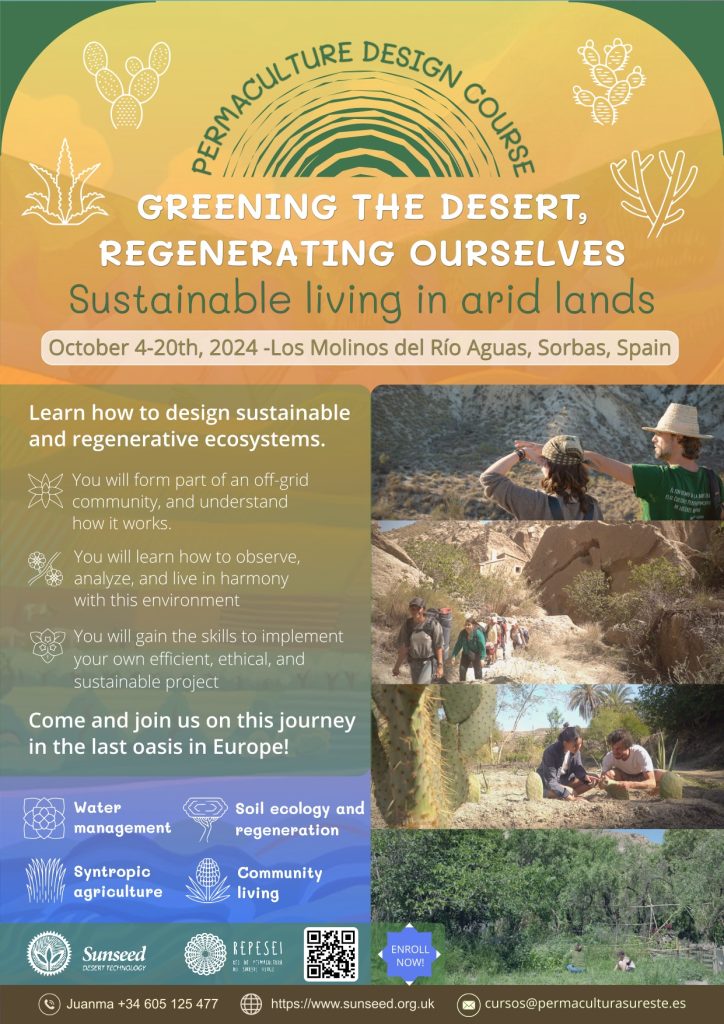
Learn about Permaculture and how to design sustainable communities and regenerative ecosystems in the desert!
Why
More and more people are starting to realize that living in a more sustainable way is the best next move they can make going forward. Permaculture is a way to obtain practical skills to achieve this goal, as well as teaching us how to communicate in a non-violent way. Some people have found that a Permaculture Design Course represents a pivotal moment in their life, and marks a transition towards a healthier relationship both with ourselves and everyone and everything that surrounds us.
Where
Los Molinos del Río Aguas, Almería, Southern Spain – an off-grid village, located in the “last oasis” of Southern Spain.
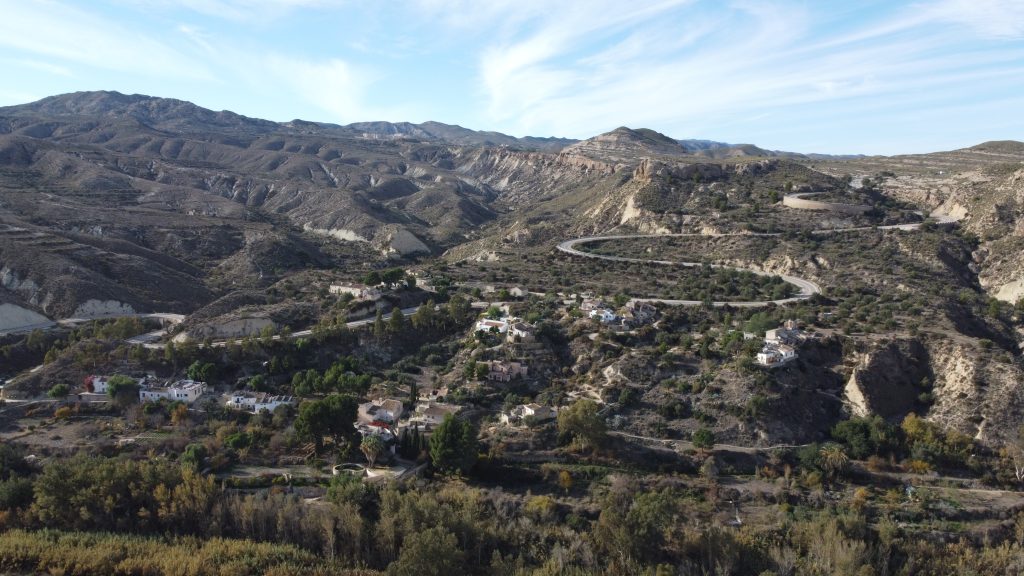
When
October 4th – 20th, 2024
Language
English
Price
€580 until July (early bird discount) or €630 from July until end of September (includes 3 meals per day + supper on the arrival day and breakfast on departure day), as well as 90+ hours of permaculture classes (theory and practical). Classes will be given by several passionate permaculturists, 3 main facilitators plus invited experts, who will be sharing their years of experience obtained in different parts of the world. Participants also receive a certificate that they have completed a recognised PDC at the end of the course.
Book now
Register your interest by filling in the inscription form
Important note: Places can only be reserved once a EUR 200 non-refundable deposit has been made.
Course location
Ecovillage “Los Molinos del Río Aguas” Sorbas, Almería
Los Molinos del Río Aguas is an ancient Andalusian village with a rich historical background tied to the abundance of water and the presence of numerous mills for producing flour and olive oil. Nestled in Europe’s “last oasis” and protected by the Natura 2000 network as well as being designated a natural park, the Los Molinos del Río Aguas valley forms part of a Karst landscape reserve, characterized by gypsum rocks. This unique ecosystem is home to various endemic species of flora and fauna.
All the houses in the village are self-sustaining: water is sourced from an ancient irrigation system and pumped into the houses using a hydraulic ram pump, while electricity is generated through solar panels. This setup offers a serene and responsible lifestyle independent of government utilities. Once nearly abandoned by the locals, the village is now home to a cosmopolitan group of approximately 30 residents, with a steady flow of volunteers and visitors enriching its vibrant community throughout the year.
There are several hiking trails along the river, and natural swimming pools for bathing. The valley lies 30 km from the coastal natural reserve, Cabo de Gata, known for its stunning, pristine beaches. The nearest city, Almeria, is 60 km away.
Sunseed Desert Technology
Sunseed is a non-formal education project, housed in Los Molinos del Río Aguas. The project has over 35 years of experience researching, learning, and experimenting with the regeneration of ecosystems, including research into the symbiotic relationships between mycorrhizal fungi and plant roots – fundamental to soil restoration.
Over the years, Sunseed has gradually evolved into an experiential education centre with visitors and volunteers working to support the ongoing tasks of the project, whilst simultaneously learning how to live in a low-impact way. Sunseed grows much of its food in the community kitchen garden, and they are currently in the process of establishing a food forest.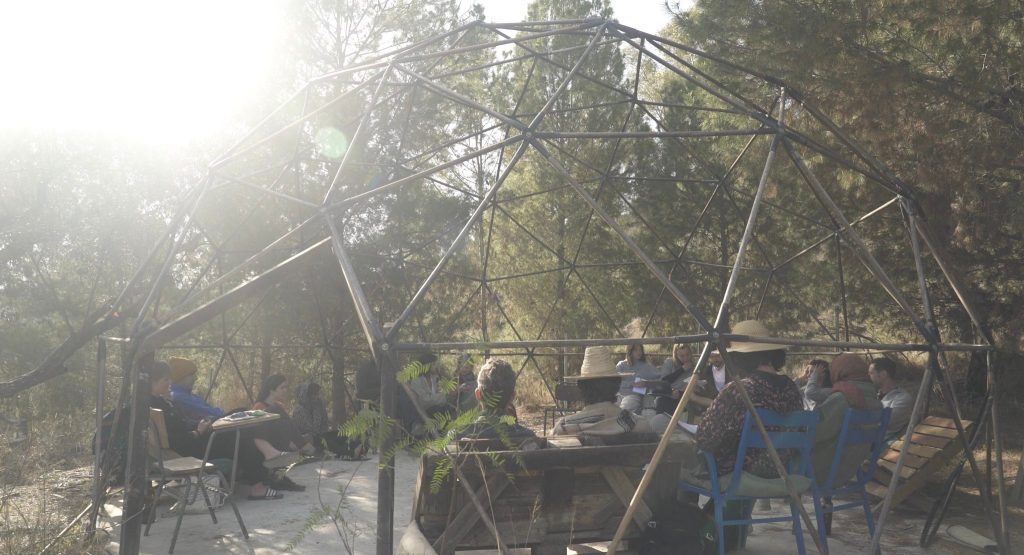
Course Description
Permaculture aims to create systems that create harmonious connections between humans and the planet. The Australians Bill Mollison and David Holmgren coined the term in the 70’s, a combination of the words “permanent” and “agriculture. Permaculture ethics, principles, and design techniques were first used to develop sustainable agricultural systems as an alternative to the growth of agro-industry and the consumer economy. From these beginnings, the concept of Permaculture has expanded and diversified to cover nearly all types of human-based systems.
Permaculture design courses (PDCs) have been developed as an introduction to this way of thinking and teach the tools and techniques needed for participants to design their sustainable systems. These courses are taught through both theory and practice and weave in both ancestral knowledge and recent discoveries. At Sunseed we showcase many examples of Permaculture in practice.
In this two-week PDC, we use the basic curriculum as set out by the UK Permaculture Association and supported by the Southeastern Spanish Permaculture Network (REPESEI).
The course will take place in a real context, in which the participants have the opportunity to gain first-hand knowledge of how, at Los Molinos, we harvest water, regenerate soil, plant trees and grow vegetables in a desert environment following Permaculture principles. During the course, we will also address aspects of social Permaculture, where we will focus on self-care, community living, equitable participation, and effective decision-making models.
Course content
We will follow the course curriculum as set out by the UK Permaculture Association and supported by the Southeastern Spanish Permaculture Network (REPESEI).
In addition to the theory, we will do many practical exercises in order to learn by doing, as well as a group final design. This will be done by participants using a Permaculture design framework, as well as all the theoretical knowledge gained during the course, and the knowledge and experience each person brings.
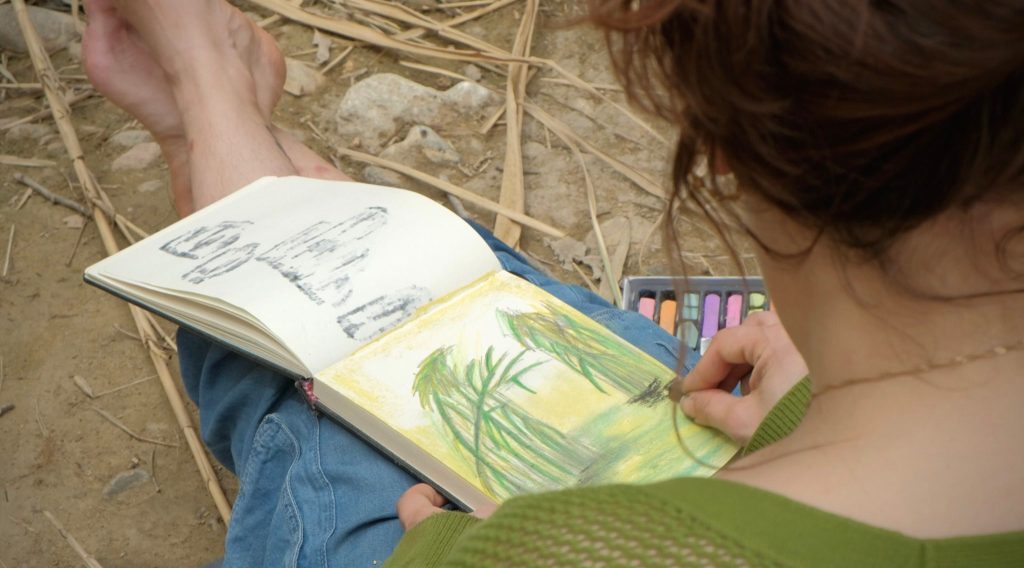
Main subjects covered:
- A short history of Permaculture, ethics and principles (Mollison y Holmgren)
- The design process itself: survey – analysis – design – implementation – maintenance – evaluation – tweaking.
- Designing for climate emergency: food independence, communities
- Soil structure and the soil ecosystem: fertility, sampling and analysis, management, regeneration (especially in arid environments).
- Water: the water cycle, water availability, capture and storage, retention in the landscape.
- Plants/trees: basic botany, the ecology of a forest, forest management, types of forests.
- Sustainable farming systems, including regenerative agriculture, natural farming, and syntropic agriculture
- Wellbeing and self-care: symbiotic nutrition, integrative medicine
- Natural building
- Appropriate technology
- Social Permaculture: social and organizational structures, group facilitation, participatory decision making, transition economics.
Practicals
- Reading the landscape + observation techniques; forest bathing
- Basic mapping: aspect, scale, how to mark out contour lines, trilateralization
- Contour line measuring
- Water retention systems
- Soil analysis
- Soil regeneration techniques
- Regenerative agriculture systems
- Natural building
- Design time
Who we are
Frances Osborn (teacher)
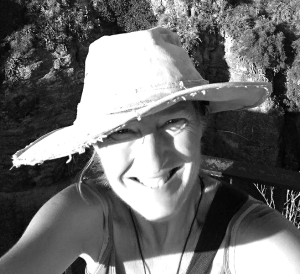
Frances is an ecologist with a degree in Environmental Sciences from Southampton University, UK, and a PhD in Insect Ecology from the Simón Bolívar University, Venezuela. In 2014, after 10 years working as a research scientist at the Eastern University, Venezuela, she returned to Europe where she did her first PDC in Brighton, UK. She has been studying and practicing permaculture ever since, and graduated with a Diploma in Applied Permaculture in March 2021. She has been teaching PDCs since 2019 at different venues, including Proyecto Rucula in Murcia and the Suryalila Yoga Retreat in Cadiz. Frances has extensive experience in garden and agricultural systems, gained from her many volunteering placements, including two years at the first Ecosystem Restoration Camp in the dry highlands to the northeast of the Murcia region in southern Spain. She is currently helping to restore an old stone cottage near Calasparra, Murcia using natural building techniques. Frances is currently secretary for Urban Street Forest, an association based in Holland and Spain that seeks to reforest degraded drylands, and is an active member of the Permaculture Network in south-eastern Spain. Frances has made volunteering her main lifestyle choice, a path which has led her to minimize her costs rather than maximize her income, and gives her the freedom to take up opportunities as they appear. Travel plays an important role in her life and the bicycle is her preferred mode of transport, as this enables her to slow down, appreciate the scenery, and enjoy the journey.
Luis Simada (teacher)
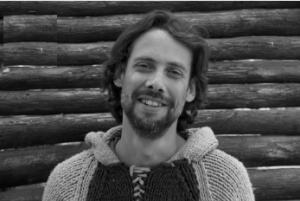
Luis is a permaculture advisor, designer and teacher and also network facilitator. He is trained as a designer, group facilitator, permaculture teacher, fermenter and project coordinator. He also participates and actively contributes in different social, activist and alternative movements like the Iberian Southeast Permaculture Network (REPESEI), La Espiral del Sureste Ibérico, the Iberia Ecovillage Network (RIE), and the Cauac Editorial Nativa or Social Permaculture Movements. He is coordinating the Ecosystem Restoration Department at Sunseed. He has also been teaching different courses about Symbiotic Nutrition, Regenerative and Natural Agriculture or Appropriate Technologies. Luis really appreciates discovering new ways to create resilience and communities, that’s why he is also Simada, traveling around Iberia supporting and designing alternative projects while continue to learn from each one of them. He loves listening, expressing his emotions, creating new ferments and healthy recipes, doing experiments, designing social solutions, playing, wild nature, ancient trees, ancestral traditions and live music.
Juanma Pinar (teacher)
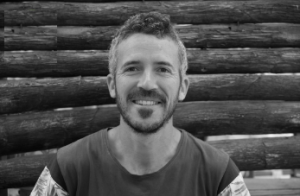
Juanma is an Andalusian biologist mostly focused on botany and agro-ecology (University of Seville, SP) with a Masters in winemaking & viti-vinicole environment (University of Bordeaux, FR). After a few years of working/traveling around the world in diverse kinds of vineyards and making different styles of wines, he started to worry about the big impact this huge industry has on the environment (such as waste of water, death of soils, harmful pesticides, elitist markets, and so on) so he came back home and deeply started to melt into permaculture philosophy.
He obtained his PDC in early 2020 in “Centro Extremeño de Permacultura La Caraba” (Cáceres), and a following “introduction to bioconstruction” course in Alcañiz (Erasmus+, Teruel), plus a certificate of “nature activities instructor -educational and social potential-” from Andalucía GDR (Development Rural Group). Then he started to collaborate with a community garden integrated in a natural park in his town (Ecohuerto Los Toruños, Cadiz) and joined climate justice movements such as Extinction Rebellion and “Ecologistas en Acción”. In parallel he was working as environmental educator for different local enterprises (Ecoherencia, Caucenatura) mostly centered on agro-ecology, nature hiking and other active learning services for public schools.
At the moment he is leading the gardens’ team in Sunseed, which includes work such as: fixing and redesigning the irrigation systems, restoring poor soils with -animal/green manure, compost and mulching- refreshing the old seedbank, replacing losts with new plants adapted to drought, researching on edible and medicinal wild-plants-based preparations, improving associations/rotations of crops, and a long etcetera of learn-by-doing processes.
Marco De Angelis (assistant teacher)
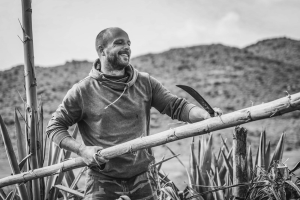
My journey began in Rome, where I was born 33 years ago with a deep love for nature. Growing up, I pursued my passion by studying Forestry Sciences and Nature Conservation, which took me on exchanges to Slovenia, Portugal, and Germany, broadening my understanding of sustainable resource management.
Completing my studies with a doctoral program in wood technologies and composite materials at the University of Hamburg, I discovered the potential of recycled materials for social housing, leading to collaborations with Ethiopia and South Africa.
Feeling a stronger connection to nature, I moved to Spain, settling in Los Molinos de Rio Aguas, an off-grid village. Here, I immersed myself in local projects and started cultivating food in our garden, finding fulfillment in sustainable living.
Now, I’m thrilled to share my journey and passion for permaculture in this course, eager to learn and collaborate for a more sustainable future.
Ricardo Riquelme (invited expert)
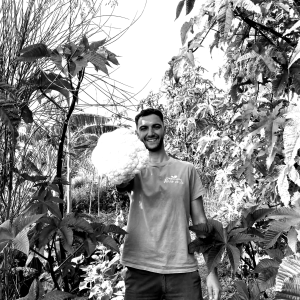
Ricardo is a permaculture designer, farmer specialized in successional agroforestry systems, efficient water management, biological pest control and zero tillage. Creator of the permaculture project “Mano Verde”, based in El Bosque (Pilar de la Horadada, Alicante) where they cultivate and regenerate the environment based on syntrophic agriculture. Apart from offering seasonal products, they recover old seeds, offer consulting and design of farms and also training for farmers and individuals.
Mónica Adán
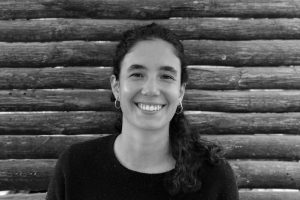
Mónica Adán is office coordinator at Sunseed Project, managing the administration, education and communication departments. She also collaborates in the Yes to Sustainability network where she is in charge of the administration and management of European youth projects and has gained experience in planning, writing, coordinating and executing grant projects. She has visited numerous ecovillages and ecoprojects all over Europe to learn more about the different living alternatives that can be created. She collaborates with projects that can help young people to discover their passions and empower them by developing their own projects.
Ashley Sheets
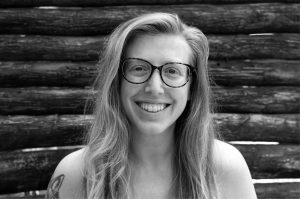
Ashley Sheets is a degrowth and environmental labour activist who works as project manager and sustainable living coordinator for Proyecto Sunseed, a non-formal education project. Her work is centred on environmental stewardship and social change, working to make more sustainable forms of living accessible and intersectional in the day to day. Her background is in degrowth, political ecology and environmental justice, and specifically focuses on the intersections where environmental movements and labour activism meet. She also collaborates with the International Degrowth Network, the Feminisms and Degrowth Alliance, and is a founding member of the Working Class Climate Alliance.
Our certifying Association
REPESEI, the Southeastern Spanish Permaculture Network.
Towards the end of the 1980s the seeds of the REPESEI (Red de Permacultura del Sureste Ibérico) were sown by a small group of locals and travelers.
This small group organized gatherings, workshops and courses, during which ideas of alternative ways of understanding life began to germinate and grow, answering the questions and needs of the individuals and groups that attended them.
In 1996, Rosa Mejuto along with a women’s group, and inspired by Permaculture Movements and Natural Agriculture, founded the REPESEI. The number of gatherings and Permaculture Projects increased, from which a network started to spread – and is still growing.
Since then there have been a large diversity of workshops and courses given and promoted by the network, among which we can highlight those by Jairo Restrepo (Columbia) and Nacho Simón (Mexico), that have taught us new ways to care for life in the soil under our feet, improving its fertility, and harmonizing the relationships between it and the plants we cultivate. Many of us now make our own bio-preparations.
Furthermore, there have been many Permaculture gatherings held at many sites from Alicante to Málaga. Currently there are 4 gatherings yearly in Winter, Spring, Summer and Autumn, as well as a mutual support network (TAM – Tragozando Apoyo Mutuo) that support projects throughout south-eastern Spain.
Dates
October 4th to 20th, 2024
You should arrive on Friday, October 4th in the afternoon / evening. Classes will start on Saturday, October 5th in the morning.
The course will end with the design presentations on Saturday, October 19th and an evening celebration. Participants should leave on Sunday, October 20th before 1:00 pm. There will be one free day mid-course. Classes will start daily at 9:00 am after breakfast and end at 8:00 pm before supper. We always start the day with a morning circle to check in with each other, and inform about the day’s programme and any logistics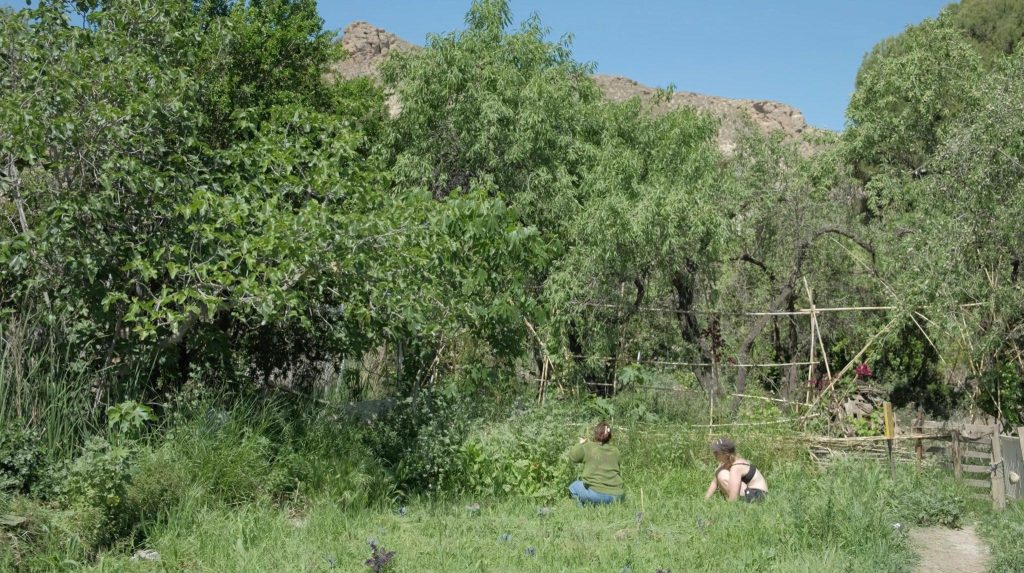
Pricing
The cost for the PDC will be EUR 580 until July (early bird discount) or €630 from July until end of September + accommodation costs and includes:
- Teaching (theory and practice) by a diverse group of passionate permaculturists all of whom bring their own knowledge and experience in the different permaculture fields (or Permaculture Petals).
- An officially recognised certificate at the end of the course.
- All meals and non-alcoholic beverages
- We provide warm and cold showers and there is room to do collective laundry.
- At Los Molinos there is lots of space to be on your own or to walk through the beautiful valley and ravine.
- Telephone coverage and Wifi
Food and Beverages
All food and (non alcoholic) drinks will be provided during the whole course. We serve vegan/vegetarian food at Sunseed, but please talk to us about special wishes for food or allergies.
Coffee, herbal teas, and drinking water will be available throughout the course. You can also bring private snacks and treats for your well-being with you.
Accommodation (separate cost)
There is a choice of a mixed dorm (sleeps 6), triple, or double rooms (limited availability). All rooms with shared bathroom. There are also some spots available for tents. Please contact Juanma (contact details below) for details.
Booking and cancellations: Register your interest by filling in the inscription form here: https://docs.google.com/forms/d/1K_pmH3l6wRhchOWQ2TWxg6-RbAHTyk1LyH3RjdFQ_Eo/edit?ts=66262a1a
Important note: Places can only be reserved once a EUR 200 non-refundable deposit has been made.
What if my plans change: A full refund minus the deposit can be made up to one month (September 4th) before the start of the course. This will be reduced to a 50% refund (minus the deposit) two weeks (September 20th) before the start of the course, and a 25% refund (minus the deposit) two days (October 2nd) before the start of the course. This applies to the cost of the course only.
How to get here
Los Molinos del Río Aguas is a small village located in Sorbas, in the southeast of Spain, 45 minutes by car from Almería, the closest city.
Since Sorbas is a small town, we will organize a pick-up in order to let you all arrive safely at the placement. Therefore, the best connection will be to get to Almería bus station, and from there take the public transport to Sorbas. We will pick you up there and take you to Los Molinos.
If your idea is to fly to Spain, the nearest airport is Almería Airport (LEI). You can usually fly cheaper, though, if you go to Málaga Airport (AGP) or Alicante (ALC).
- From Málaga Airport to Almería, take a bus to Almería. The journey takes approximately 3 hours and 30 minutes and costs 22 EURO (one way).: Check bus timetables AGP-Almería here!.
- From Almería Estación Autobús. There are several buses per day to Sorbas. The schedule varies depending on the day:
- – Mondays to Fridays: 8:30, 11:00, and 15:30.
- – Saturdays: 11:00.
- – Sundays: 8:30 and 11:00.
- From Alicante to Almería you can take a bus to Murcia which has daily direct connections, and from there take a transfer to Vera. Then from Vera, there is the connection to Sorbas by bus. Check here the bus timetables Vera-Sorbas.
Make sure to check the bus timetables and availability in advance, especially for connections from Málaga and Alicante.
Please note that activities will start on Saturday, the 5th of October at 8:30 am, so please organize yourself in order to be able to arrive on Friday evening.
Activities will end on the evening of Saturday, the 19th of October, so you can plan your trip back to your country starting from Sunday morning (20/10/2024).
Book now
Register your interest by filling in the inscription form







